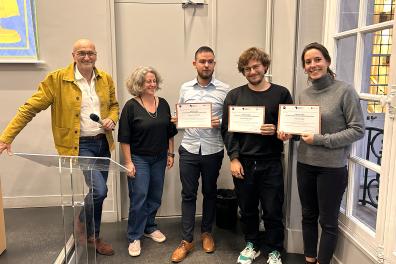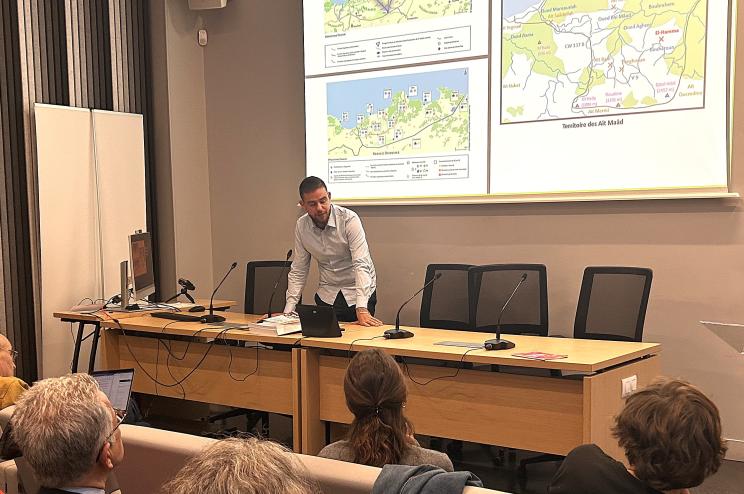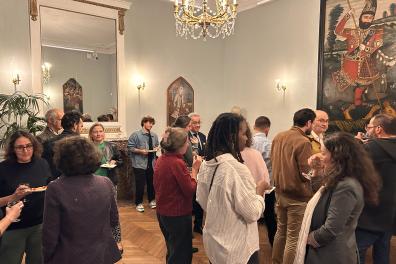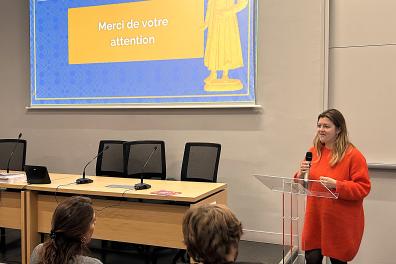GIS Études africaines 2025 thesis awards ceremony

Celebrating the excellence of young research in France
Since 2022, the GIS Études africaines en France of the CNRS has awarded an annual thesis prize designed to reward young researchers whose work stands out for its rigor and scientific contribution.
Each winner receives a dotation of €2,500, accompanied by support for the publication of his or her research with ENS Éditions, in order to promote its dissemination to a wide audience, both scientific and non-specialist.
Winners bring the world to their feet
The ceremony opened with a welcome from Philippe Advani, President of the Inalco Foundation, who paid tribute to the laureates' careers and work. He then gave the floor to Hervé Pennec and Stéphanie Lima, director and deputy director of the GIS Études africaines en France, who recalled the importance of this distinction and the essential role of young researchers in the field of human and social sciences.
Each laureate then presented his or her research:
Mathilde TARIF - State, capital, identity. Désaccumulation et contraintes internationales en République centrafricaine (1960-2020), edited by Gilles Dorronsoro (Université Paris 1 Panthéon-Sorbonne, CESSP) and Florence Brisset-Foucault (Université Paris 1 Panthéon-Sorbonne, IMAF - Aubervilliers).
Based on archival work and nine months of investigation in the Central African Republic, this thesis questions the difficulties of consolidating the postcolonial state, between dependence on private capital and international constraints.
Corten PÉREZ-HOUIS - The city in the mold. Mise en ordre et résistances des filières de brique rouge dans la production du Grand Caire (Égypte) et du Grand Khartoum, edited by Éric Denis (Université Paris 1 Panthéon-Sorbonne - Géographie-Cités) and Alice Franck (Université Paris 1 Panthéon-Sorbonne - PRODIG).
Through an analysis of the production of red brick, an emblematic material in both capitals, this thesis explores the paradoxes of urbanization and the tensions between development, resistance and urban recomposition.

Massinissa GARAOUN - Amazigh and Arabic in the Babors massif (eastern Kabylia, Algeria): contribution to the typology of linguistic contacts, supervised by Amina Mettouchi (EPHE - LLACAN) and Martine Vanhove (CNRS, LLACAN).
This research examines the dynamics of contact between Jijeli Arabic and Tasahlit in the Babors massif, and sheds light on forms of bilingualism and sociolinguistic relations between speaker communities.
An evening of exchange and conviviality
Illustrated by photographs from the field, the presentations captivated the audience with their clarity, commitment and human depth. The winners spoke of the challenges encountered in the field - sometimes in sensitive political contexts - and expressed their gratitude to their loved ones and supervisors.
Marion Bourgain, Deputy Director for West Africa at the Ministry of Europe and Foreign Affairs, concluded the awards ceremony by drawing a link between research and diplomacy. She returned to her own career, marked by experience in research, and once again stressed the importance of highlighting fields of study relating to Africa and its diaspora.
The evening continued with a cocktail reception at the Salon Borel, conducive to exchanges between researchers, teachers, family and friends. For the occasion, Massinissa Garaoun had prepared a culinary specialty from the Babors, a convivial and tasty extension of her research immersion.
The Inalco Foundation congratulates the laureates on the quality and richness of their work, which contributes to advancing knowledge of African societies and cultures. The Inalco Foundation is proud to be associated with this recognition of excellence in research in the humanities and social sciences.

